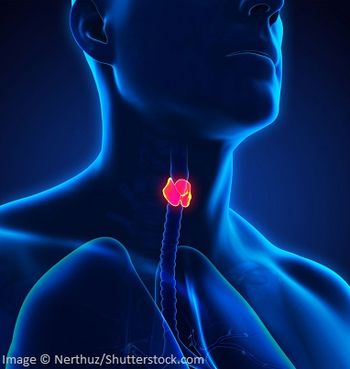
- ONCOLOGY Vol 13 No 7
- Volume 13
- Issue 7
New Genetic Mechanism Associated With Thyroid-Related Diseases
In the course of a cancer-related study, researchers at The University of Texas M. D. Anderson Cancer Center stumbled upon an important genetic mechanism that may help in the treatment of two rare thyroid diseases.
In the course of a cancer-related study, researchers at The University of Texas M. D. Anderson Cancer Center stumbled upon an important genetic mechanism that may help in the treatment of two rare thyroid diseases.
Drs. Steven I. Sherman, assistant professor of endocrine neoplasia, and Madeleine Duvic, professor of dermatology, both in M. D. Andersons Department of Internal Medical Specialties, demonstrated that targretin, an RXR retinoid compound, causes hypothyroidism. This discovery also revealed a previously unknown genetic mechanism in the pituitary gland.
The findings were published in the April 8th issue of The New England Journal of Medicine.
Thyroid-Stimulating Hormone Synthesis Inhibited
Targretin acts by inhibiting the pituitary gland's synthesis of the thyroid-stimulating hormone necessary for normal thyroid hormone production, said Dr. Sherman. The finding gives endocrinologists a better understanding of how the pituitary gland is regulated.
Hypothyroidism is a serious condition that is easily treated and resolved. What was important was the discovery of the mechanism by which the pituitary is regulated, said Dr. Sherman. This was a case of going where your data leads you and coming up with an unexpected finding. It opens up a whole new area of investigation.
Dr. Sherman said the discovery may have an immediate impact on the treatment and outcome of two rare thyroid diseases for which current treatment is often unsuccessful. Both diseases, thyroid-stimulating hormonesecreting pituitary adenomas and isolated pituitary resistance to thyroid hormones, cause unusual forms of hyperthyroidism due to pituitary stimulation of the thyroid gland.
Sweaters in Houston in August
The discovery was a result of a phase III clinical trial of targretin as a treatment for cutaneous T-cell lymphoma that is currently being conducted at M. D. Anderson. During the course of the study, Dr. Duvic noted that after a few treatments of targretin, 95% of patients developed hypothyroidism. The patients, who prior to ingesting targretin showed no signs of the condition, began to experience fatigue, memory loss, depression, and a heightened sensitivity to cold.
All of the patients were severely fatigued, but even more surprising, most were so cold they were wearing sweaters and turning off their air conditioners in Houston in August, said Dr. Duvic.
Intrigued by the consistent development of this side effect, Dr. Duvic referred her patients to Dr. Sherman. Because the pituitary, sometimes called the master gland, acts like a thermostat, said Dr. Sherman, a malfunction in the pituitary affects the thyroid, which can disrupt the metabolism and specific functions of organs throughout the body.
An estimated 10 million Americans are affected by thyroid-related diseases, and the incidence is disproportionately higher for women, said Dr. Sherman.
The original study using targretin to treat skin cancer is ongoing. Targretin has also been used in studies as a treatment for other cancers, such as breast, lung, and head and neck cancers. Although hypothyroidism occurred in patients with cutaneous T-cell lymphoma, patients with other cancers may be less susceptible to this effect of targretin.
Articles in this issue
over 26 years ago
Discussing Disease Progression and End-of-Life Decisionsover 26 years ago
Beyond 5-Fluorouracilover 26 years ago
Nonsurgical Therapy Holds Promise for Basal Cell Carcinomaover 26 years ago
Photodynamic Therapy Effective for Swallowing Problemsover 26 years ago
Novel Gene Therapy to Clear Blood Clots in Leg Arteriesover 26 years ago
Bills Would Require Private Insurers to Pay for Cancer ScreeningNewsletter
Stay up to date on recent advances in the multidisciplinary approach to cancer.



































